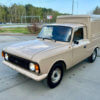The production plan for 2023, which envisaged the production of 400 thousand cars, was reduced by 10 percent, Interfax reports, citing AvtoVAZ head Maxim Sokolov. At the same time, back in September, the company stated that being included in US sanctions “did not have a significant impact” on its work. True, with a caveat – the plant admitted that it cannot influence secondary factors, such as the passage of foreign payments or the regularity of supplies of materials or subcomponents.
AvtoVAZ was included in the US sanctions lists in mid-September, at the same time other Russian automakers, including Moskvich and Sollers, were included in them. Formally, the ban on working with sanctioned companies applies only to US residents, but in reality, restrictions apply to all foreign companies, since they risk falling under secondary sanctions.
At the end of September, Sokolov said that AvtoVAZ was ready for Western sanctions and they did not have a serious impact: car production did not stop, but there were and are problems with the supply of certain components. So, the other day it became known that at a certain point the plant had accumulated more than 15 thousand under-equipped cars. By the end of the year, AvtoVAZ intends to solve this problem – the cars will receive the missing equipment and will be shipped to dealerships.
AvtoVAZ also confirmed that Granta can again receive an “anti-crisis” version without airbags, while the cars will comply with the regulations and rules in force in Russia. It is still unknown when such state employees will go on sale.
Currently, AvtoVAZ produces Lada Granta, Vesta and the Niva family. Next year, Largus production will resume – it has been moved to the Lada plant in Izhevsk. It is also planned to assemble the electric e-Largus there.
Keep it simple: “anti-crisis” cars for Russia







